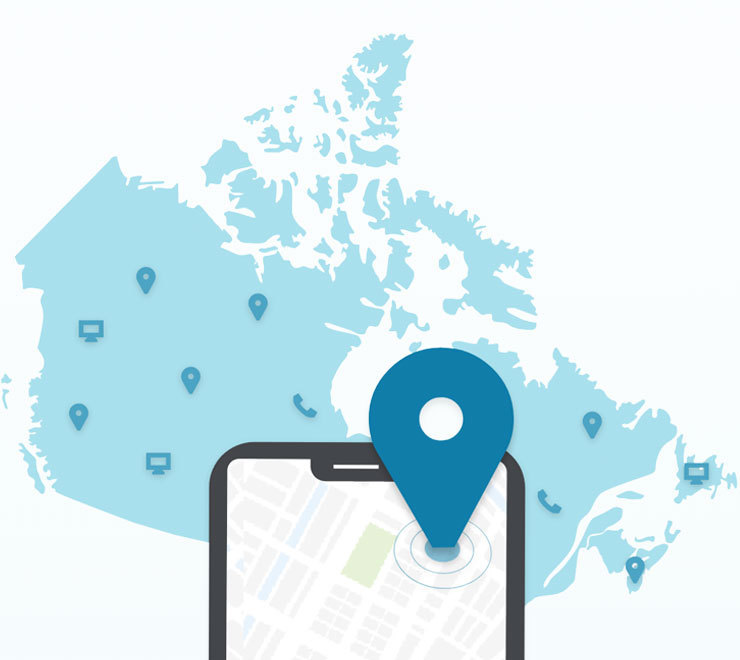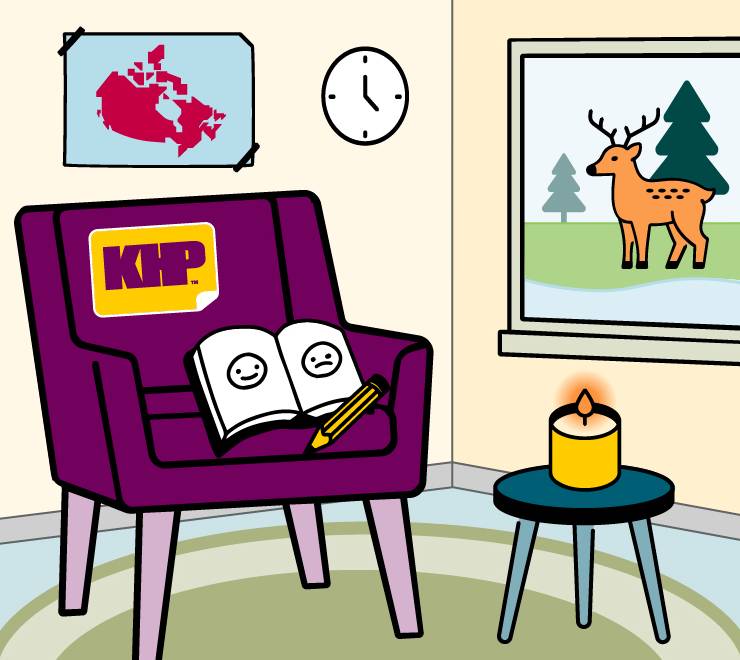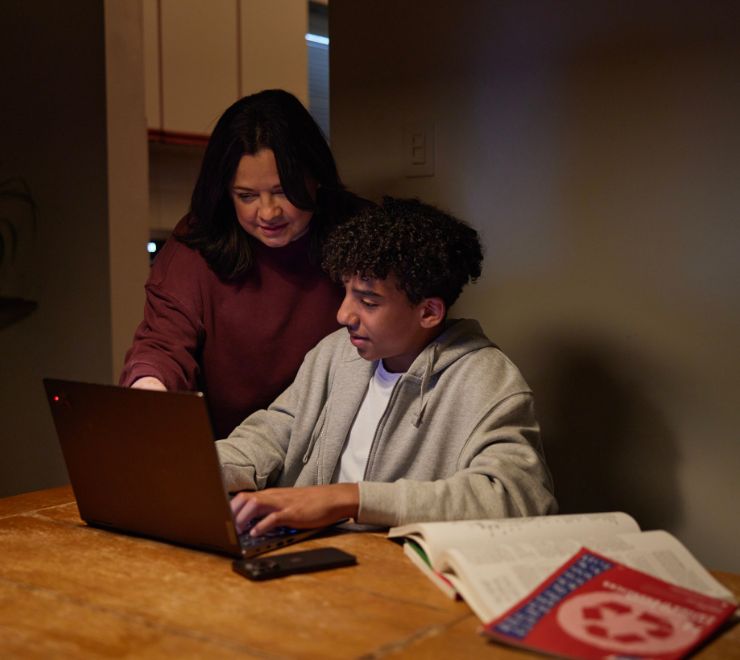For some people, talking about mental health can be an important part of well-being. Opening up about topics related to your mental health can help you figure out your thoughts, feelings, needs, hopes, etc. But what if the folks closest to you are uncomfortable with the concept and / or are unsure how to communicate about it with you? Here, Kids Help Phone shares tips to start a conversation about mental and emotional health with someone you trust. You’ll also find other support options to explore if the person you choose to chat with isn’t open to talking about it right now. Because taking control of your own wellness journey — including your personal needs, boundaries and more — can be an empowering experience.
What is mental health?
An info piece on understanding mental health so you can feel more empowered to talk about it.
What might be underneath the discomfort around talking about mental health?
Mental health is in the spotlight now more than ever, but it can still be a difficult concept for folks to accept and understand. Some people may experience discomfort, nervousness, embarrassment and more when talking about mental health and well-being. Many factors may contribute to feelings like this, including:
- a hesitancy / fear of bringing up strong emotions
- a lack of education / experience around mental health
- a past experience communicating about mental health that didn’t go as planned
- cultural beliefs
- generational / familial attitudes
- inequity in health-care systems
- misconceptions in the media
- religious / spiritual practices
- systemic barriers to accessing support (e.g. stigma, stereotypes, discrimination, etc.)
- trauma
Reflecting on these factors may help you explore if / how you may approach someone to talk about mental health. Here are some questions for you to consider:
- Do any of the listed factors / possibilities resonate (apply) in my situation?
- How might they affect the person’s ability to respond in a way that feels respectful / supportive?
- How might I start a conversation that acknowledges the other person’s position, while also sharing my hopes / needs?
It may also be helpful to reflect on / remind yourself why mental health is important to you. As a starting point, you can check out the video below from a Kids Help Phone National Youth Council member about why mental health is important to her.
To me, mental health is important as it influences how we think, feel and act. It impacts our daily function, the decisions we make and the relationships we form.
From Jan 2019-Jan 2022 75% of people said they shared something with KHP they’ve never shared with anyone else.
How can I approach someone who’s uncomfortable talking about mental health?
Sometimes, we need to share what’s going on for us with someone we trust and who feels close (e.g. a friend, relative, community member, etc.). If you think the person you need to talk to is not overly receptive (open) to chatting about mental health, there are a few different things you can try to share what’s on your mind while respecting boundaries (tips from our friends at Good2Talk).
While you can prepare / plan for how to approach a discussion, try to keep in mind that how the person responds is ultimately up to them. As difficult as it can be, it’s not your responsibility to change someone else’s mind about something. However, you get to choose how you respond from there. Only you can know what you’re thinking / feeling, what you’d like your wellness journey to be like and who you might let in to support you along the way.
And remember, it’s OK if you decide that, in order to take care of yourself, you need to try connecting with someone else you trust, or seek professional support. The tips below are available to empower you to talk to the people closest to you if / when the time is right.
Tip #1: Let the person know you’d like to talk
You can let the person know you’d like to share something with them that’s important to you, and that you know it may be hard for them (or even both of you) to talk about it. Invite them to chat in a space and at a time that works for everyone.
You may also want to ask the other person if they have any boundaries you should keep in mind. This might be a good time to consider introducing your boundaries / hopes for the conversation, too. That way, you both can put your safety first. You can also check out these resources for tips on identifying and reflecting on your emotions before your discussion:
- Talking About Your Feelings (KidsHealth)
- Anchor booklet (mindyourmind)
Tip #2: Share helpful resources with the person
Another way you can bring up a difficult subject is by sharing related resources with the person. You can let them know you’d like to send them some material to read (on their own or with you) so they can be more prepared to chat. These resources could be about mental health in general, or specific to the topic you’d like to go over. You may even choose to share real-life stories from people who have similar lived experiences, which can help us all relate and feel less alone. Here are a few basic resources for you to consider / that may be helpful to you and the other person as you navigate your wellness journeys:
Tip #3: Start a conversation
If you feel like the person you trust is more open to talking about mental health at this point, you can have your chat. You can ask them to keep an open mind, and to let you know if you’re covering a topic they’re not ready to discuss at the moment. You can also use words that may feel familiar to them (e.g. you can say, “I need to talk to you about my feelings…” or, “I’d like to work on my wellness with you…,” etc.).
Sharing your hopes / needs for the conversation up front can help you both work through things that feel a bit vulnerable. This can be especially helpful when you’re sharing with someone who might not be as open to a particular topic. While we can’t guarantee the outcome, we can help clarify things for the other person as much as we can. This can increase the chances of a response that feels helpful to us.
To do so, you can start by asking yourself, “What do I most hope will come from this conversation?” During your chat, this could turn into something like, “By sharing this with you, I’m hoping that…,” “I know these things can be hard to talk about. I just really need…” or, “I don’t need anyone to fix this, I just need someone to know that…”
You can use the tips in the resources below to continue your conversation while putting mental health and safety first:
Tip #4: Explore other support options
Sometimes, it can take a few tries to find the best person to talk to about whatever’s on your mind. If you don’t feel like the first person you reach out to can help you right now, you can connect with someone else you trust and / or research self-directed supports. You can check out the resources below to continue navigating your wellness journey:
Talking about mental health can be challenging for some people. Try to keep in mind that support is always available, even if it takes some time to find what works best for you. If you’d like to talk about your options and what’s going on for you, you can always connect with a safe adult or Kids Help Phone. We can listen and help you work through issues, including supporting you in talking to the people in your life. You may also choose to contact Kids Help Phone to practise having a tough conversation, or just to have a session with another person. And if you’re in crisis and need support immediately, you can contact the emergency services or mobile crisis support (if available) in your area. Your safety and well-being are a priority.























